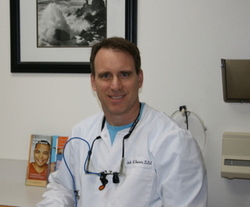The term “root canal” is usually used to describe a particular type of Endodontic therapy whereupon the infection inside the tooth’s root canal system is cleaned, shaped, and restored or sealed with a special filling material. You may ordinarily expect your treatment to be fairly uneventful and painless, similar to having a tooth filled. Treatment time can vary dramatically from tooth to tooth depending on the location, shape, and number of root canals present; however, under local anesthetic, treatment is usually very comfortable. Occasionally, patients have been known to fall asleep during treatment, because most often it is the first time in awhile that they have been able to lie down and relax without their tooth hurting. Most often, treatment is completed at one appointment, but sometimes more than one appointment is required.
It is VERY IMPORTANT to have your tooth properly restored after root canal therapy is completed. If this is not done, eventually you will lose the tooth from non-restorable re-infection or fracture of the tooth.
Endodontics is the area of dentistry concerned with the prevention, diagnosis, and treatment of disorders of the dental pulp. The pulp is a soft tissue which contains the nerves, arteries, veins and lymph vessels of the tooth. It lies within the center of the tooth’s crown and root(s). When the pulp is diseased or injured and unable to repair itself, the pulp dies. The most common cause of pulp death is a deep cavity or a tooth fracture. The infection that develops inside the pulp builds up pressure within the roots of the tooth and usually causes spontaneous and lingering pain. Whether there is pain or not, if this infection is left untreated, it will spread out the root ends into the surrounding bone, destroying bone, and into the soft tissue eventually causing swelling. Occasionally, this infection can spread to other areas of the body and become life threatening. Once the tooth pulp is irreversibly damaged, you must either have root canal therapy or you must have the tooth removed in order to eliminate the infection.
Ordinarily, as long as the root canals are cleaned and filled, antibiotics are not indicated. With the infection from the roots gone, your own body’s immune system can usually take care of any remaining infection present in the surrounding bone and soft tissue. If the tooth was painful to begin with, it usually feels much better immediately following root canal treatment; however, it is not uncommon for the tooth to be sensitive and remain tender for some time after. With some teeth, conventional root canal therapy alone may not be sufficient, and further, more specialized treatment will be needed.
Endodontic treatment can safely and comfortably save a tooth that otherwise would have to be removed. In fact, root canal therapy is successful approximately 95% of the time. Remember, a healthy restored tooth is always better than an artificial one. Your endodontically treated and restored tooth could last a lifetime, if you continue to care for your teeth and gums. As long as the root of the tooth is properly nourished by the surrounding tissues, your tooth will remain healthy.

